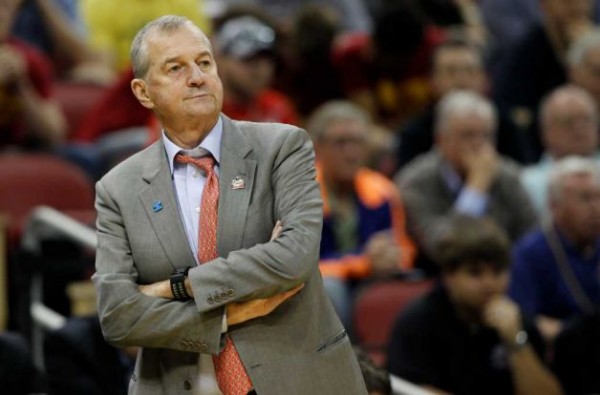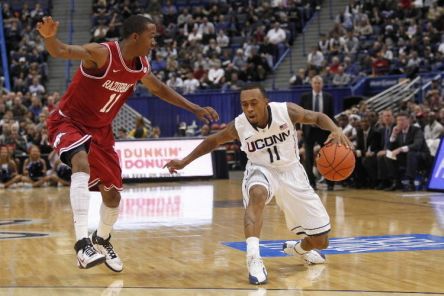Let Them Play: A Case For UConn’s Big East Tournament Eligibility
Posted by mlemaire on October 19th, 2012When the NCAA denied Connecticut‘s final appeal and ruled the Huskies ineligible for the 2013 NCAA Tournament, it seemingly slammed the door on any postseason opportunities for the team as the conference presidents ruled in March to bar any ineligible teams from the conference tournament. In fact, there can’t have been too many people who were even aware that UConn has one last card to play until New Haven Register reporter David Borges just casually dropped this revelatory nugget in the middle of a recent blog post.
Of course, UConn won’t be able to participate in this year’s event. Or will it? While the chances are extremely slim, UConn is holding out a bit of hope that the league presidents change their mind on their decision last March to bar any postseason-ineligible teams from its conference tourney. The presidents meet again in a couple of weeks in Chicago for what would appear to be the Huskies’ last chance. UConn is hoping that, since the players responsible for the poor APR scores are long-gone (and, now, Jim Calhoun is gone, too), that the presidents may reconsider.
Now it should be noted that Borges immediately noted that this was extremely unlikely and quoted Big East commissioner Mike Aresco as saying that UConn had notified the presidents about making one final plea, but still, why the heck didn’t more people know about this last-ditch opportunity?

Jim Calhoun and the roster of the 2009-10 team are gone, so why can’t Connecticut play in its conference tournament? (AP Photo)
At any rate, UConn may not have told the league presidents whether it wants them to reconsider their decision, but we will gladly make their case for them. The program should not go unpunished for its academic shortcomings, but its current players and head coach — whom had no part in what caused the ineligibility in the first place — deserve something to play for.
In order to build a successful case, we need to examine how we even got here in the first place. In October of last year, the NCAA passed a new set of academic standards that stated that schools must have a two-year APR average of 930 or a four-year APR average score of 900. APR stands for Academic Progress Rate which the NCAA uses to determine the continued academic success of the players within a specific program. Unfortunately for UConn, the school’s APR for the 2009-10 school year was just 826, and even though the program’s APR bounced back to 978 for the 2010-11 season, the damage was done and the averages weren’t going to be up to snuff. Now feels like a good time to point out there is nothing wrong with the NCAA punishing schools that don’t graduate enough of their players. The NCAA may just be trying to prop up their claims of “academics first” but they are at least trying to hold schools accountable for the players in their care and under their direction.
The issue is that the APR is a far from perfect measuring tool and that the players being punished (i.e., the ones currently on the team) weren’t the players responsible for the academic issues. Here is the Huskies’ current roster and coaching staff. And here is their roster and coaching staff from the 2009-10 season. The lone holdover is assistant coach George Blaney and while he may bear some responsibility for past players slacking, you can hardly justifying punishing a whole team by citing Blaney’s presence in the media guide.
UConn not only used the same logic in their appeal to the NCAA, but they also used data to show that recently instituted school policies had improved the program’s academic standing and that the program was headed in the right direction. In the end it didn’t matter, as the NCAA denied all of the school’s appeals and withstood criticism, even from folks like Connecticut Governor, Dannel P. Malloy. But we aren’t here to criticize the NCAA for their decision, in fact, they had made it clear to schools that standards needed to be met, and Connecticut didn’t meet them. It doesn’t matter how much the school has done after the fact to meet those standards, revisionist history doesn’t change the need for a punishment. And yes, players are being unfairly punished. But they chose the school and they chose the program; they can leave if the NCAA Tournament is that important to them.
We aren’t even here to criticize the Big East presidents for their decision to double down on the NCAA’s decision, we are merely pointing out that almost all of the characters in this story are gone, and these players and their first-year coach Kevin Ollie deserve something more than the regular season to play for. Yes, the Big East presidents may lose some face, and they may suffer some moralistic criticism from those arguing they are putting athletics over academics, but this really seems like an easy decision. The conference just inked a new contract with Madison Square Garden about hosting rights to their conference tournament, and UConn is a marquee program — one of the few remaining after this season — and they always draw a big crowd in New York City. And while Ollie and his team may have said all the right things about their ineligibility at Wednesday’s Media Day, you know they would kill to get the chance to play spoiler and be the buzzsaw of the Big East Tournament. These kids and their coach haven’t done anything wrong.

Big East fans would love the chance to see Ryan Boatright do his thing in Madison Square Garden this season.
And it’s not as if the program is going unpunished either. The Big East Tournament in Madison Square Garden is a big deal, perhaps one of the most competitive and entertaining conference tournaments in the country — especially s0 this year with all the last hurrahs. But it is not the NCAA Tournament — not even close. UConn will still miss out on the true postseason no matter what, and they will also miss out on all the revenue that comes with it, which seems like a deserved punishment given their uninspiring academic track record.
The NCAA gets to punish a deserved offender, the school — which has already implemented remedial changes — learns its lesson, and the players who are getting the bum rap get a chance at their own version of the postseason. Done and done. Of course now that we have laid this out so logically it will probably all go for naught, conference presidents traditionally being so inflexible and all, but at least we tried. Let them play, Big East presidents.









































